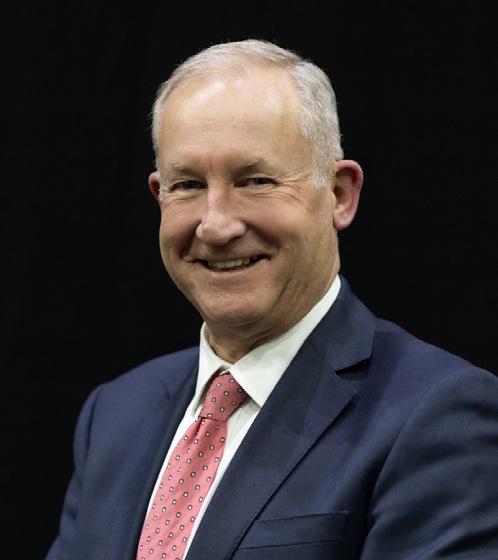
5 minute read
Standards
Putting Building Compliance and Construction Experts at the Heart of Standards
Advertisement
Presenting at and attending the BOINZ Conference in Rotorua gave me a much-valued opportunity to meet with many of you, members of BOINZ and experts in your fields of building compliance and construction.
Yours is a sector we at Standards New Zealand maintain a special relationship with. For me personally too, having previously worked as a building inspector, building surveyor and architectural designer, and in more recent times worked with many of you in a regulator role capacity with MBIE and the former Department of Building and Housing and Building Industry Authority before that. It was great to reconnect with many old faces and share in the heartwarming and well-deserved awards evening. An opportunity to recognise and reward the extraordinary and sometimes unsung heroes that help ensure our buildings are built to protect New Zealanders and endure the rigours of our environment. Standards have been at the heart of your sector; from our beginnings in 1932 in response to the Napier earthquake, to today with standards forming invaluable tools for Acceptable Solutions under the Building Code and 131 standards for compliance generously sponsored for free download by the building regulator MBIE’s Building System Performance branch. While standards play a crucial role in today’s design and construction practices, only a few who use them give thought to where standards come from. They are good practice, developed by subject matter experts who have come together to agree consensus on the best way forward. Quality construction is built on good standards. Durability is built on good standards. Safety is built on good standards.
Is it your time to represent, participate, contribute, and connect on a standards development committee?
Behind the scenes at any given time, hundreds of experts are meeting with industry partners, or even competitors, or international peers to share their distinct and specialist skills, expertise and needs, listen to others and find a common ground that satisfies all. When a standard is developed through the consensus and representative approach it helps prevent monopolies or any individual vested interest from unduly influencing the outcome. It also enables and supports technical expertise and wisdom, and consumer, industry and regulator perspectives to be heard
and captured appropriately. Result, a standard everyone around the committee table believes and buys into, agrees is fit for purpose and feels proud of through the hard work by all.
Standards are nothing without people. And that’s where you come in.
Standards New Zealand is New Zealand’s national standards body under the international ISO (International Organization for Standardization), IEC (International Electrotechnical Commission) and joint Australian/New Zealand standards system. Are you interested in representing your organisation, industry or area of specialism on a standards development committee? Can you share your years of applied skills, expertise and wisdom, and make a valuable contribution now and for the future? If yes, then we invite you to complete an expression of interest to become a standards development committee member. There are several benefits that come from being active as a committee member; direct access to shaping standards you might use; a good professional network of industry experts relevant to your work; an opportunity to learn from others and build your knowledge and real experience for your professional development; and you can leave a valuable contribution and legacy for your sector. You can make a huge difference with national or international impact. But don’t take our word for it. Learn more from some of the hundreds of diverse committee members already contributing to standards in development:
‘You need the courage and inquisitive mind to ask questions that are rarely voiced, which keeps all committee members learning. New Zealand is good at finding innovative and elegant solutions that enable us to punch above our weight!’ Brian Fitzgerald, energy sector committee member ‘When you have a distinct specialism it’s important to leave your mark for others to benefit from. That’s how we grow as industries, societies and individuals. Putting that knowledge into standards, means you’ve given something back that will shape your area of work for years to come.’ Dr Sara Broglio, Seismic engineer and committee member

‘I believe committees need a good balance of younger and older, more experienced people and not just those involved in policy writing, but creatives, innovators, pragmatists.’ Alison Holt, IT specialist and committee chair
‘It’s quite a feeling to have an impact on a standard that you use in your daily work. The standardisation process helps to resolve differences. Through the consensus approach, it’s important to listen to everyone. It allows for robust discussions considering multiple viewpoints and helps prevent biases so you can create one source of truth. With limited viewpoints and opinions, decision makers may ignore agreed good practice and this could influence decision making. Without a standard, an authority could set its own criteria around what’s appropriate, without the agreement of the industry or sector.’ Sally Hargraves, Engineering geologist and P4431 committee member Your next steps
Tell us about yourself – complete an expression of interest via our online form at https://www.standards.govt. nz/develop-standards/standardsdevelopment-committees/ become-involved-in-standardsdevelopment/ Where there is not a committee currently active we will maintain your details on our database for future reference. From here the Standards Approval Board assesses nominations for diversity of skills, knowledge and experience, and looks for balance and wide representation. BOINZ members use standards and BOINZ members help develop standards, often because they have been nominated by BOINZ. Together, with Standards New Zealand, we can all help make sure New Zealand homes, workplaces and public buildings are built and designed to be safe, durable, efficient, adaptable and stand strong for generations to come. A huge thankyou to those BOINZ members who have already contributed to and supported standards development committee work to date.
By Malcolm MacMillan National Manager, Standards New Zealand











